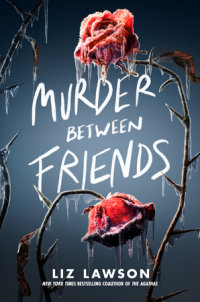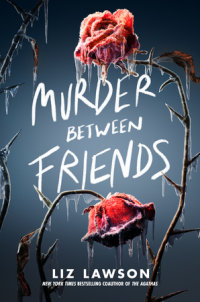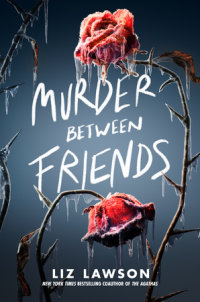Murder Between Friends
Author Liz Lawson




Murder Between Friends
Two years ago, the murder of a neighbor tore three best friends apart--now the killer is going to walk free and the ex-friends are going to have to face the past--and each other--in another twisty thriller from the New York Times bestselling co-author of The Agathas.
Grace, Henry, and Ally grew up together on the same block. They used to be best friends--until Grace's testimony put Henry's brother, Jake, away for killing their English teacher. Now,…
Two years ago, the murder of a neighbor tore three best friends apart--now the killer is going to walk free and the ex-friends are going to have to face the past--and each other--in another twisty thriller from the New York Times bestselling co-author of The Agathas.
Grace, Henry, and Ally grew up together on the same block. They used to be best friends--until Grace's testimony put Henry's brother, Jake, away for killing their English teacher. Now, two years later, Ally and Henry hate Grace, and Grace is doubting what she thinks she saw that night.
It feels like everyone's getting a second chance, then, when due to a mistrial, Jake is suddenly released. And Henry knows his brother is innocent, but when Grace reaches out to say she’s rethinking what she saw the night of the murder, Jake’s reaction is confusing. He doesn’t want Henry—or Grace--getting involved.
For Ally not getting involved isn’t an option, and there’s nothing Grace can say to convince Ally she’s not the enemy. But can Ally afford to push Grace out when she’s one of the only other people willing to believe in Jake’s innocence?
The clock is ticking. Jake’s new trial date is about to be set, and he's sure to be found guilty again unless there's new evidence to prove he's innocent. Grace, Henry, and Ally are going to have to decide whether you can trust an old friend now that they’re your enemy.
An Excerpt fromMurder Between Friends
Ally
October 6
“How do you feel, knowing they’re letting a killer out of jail today?”
I’m getting out of my car when the question is screamed at me through the chain-link fence that runs the perimeter of school. I turn to find a reporter, young and fresh-faced, staring at me with excited eyes from the other side of the metal weave.
She must not know who I am.
I clench my keys in my fist, the sharp edges digging into the tender flesh of my palm, as I hold eye contact with her. Trying to figure out what to do. What to say. How far I want to take this.
A few beats go by, and her smile begins to droop.
“Jake Hanson?” she offers, like I might not know what she’s talking about. “He’s being released later today? After serving only”—a pause here, as she scrambles to remember—“thirteen months of his twenty-five-to-life sentence. He’s headed back. To Brawner. How does that make you feel—”
I slam my car door shut,…
Ally
October 6
“How do you feel, knowing they’re letting a killer out of jail today?”
I’m getting out of my car when the question is screamed at me through the chain-link fence that runs the perimeter of school. I turn to find a reporter, young and fresh-faced, staring at me with excited eyes from the other side of the metal weave.
She must not know who I am.
I clench my keys in my fist, the sharp edges digging into the tender flesh of my palm, as I hold eye contact with her. Trying to figure out what to do. What to say. How far I want to take this.
A few beats go by, and her smile begins to droop.
“Jake Hanson?” she offers, like I might not know what she’s talking about. “He’s being released later today? After serving only”—a pause here, as she scrambles to remember—“thirteen months of his twenty-five-to-life sentence. He’s headed back. To Brawner. How does that make you feel—”
I slam my car door shut, heart thudding against my rib cage. Walk over to her slowly. Anger vibrating off me so hard that I’m surprised she can’t feel it—that she doesn’t run away.
“Most people in town are very unhappy.” This lady just can’t quit. She’s clearly misinterpreted my silence as ignorance. “The decision to vacate his sentence is enormously controversial—as you probably know,” she adds hurriedly, like she’s remembered that I might not be entirely stupid. “Considering it was based on a technicality, rather than evidence of Jake’s innocence . . . how does it make you feel? You’re a student at Brawner High. Did you know Miriam Appelbaum? Or Jake? Did you know Jake? Did you see the fight they had that day?”
I stop on my side of the chain-link fence. She leans forward expectantly. She thinks I’m about to make her day, give her a great quote she can use in her broadcast. Tell her how terrified I am that Jake’s coming home. How violent he was.
“Listen to me,” I hiss at her. “Jake Hanson is innocent. Got it? He didn’t murder anyone. You can quote me.”
And with that, I walk away.
The hallways inside are buzzing with energy. Bad energy. The sort that comes before a riot, before people start burning things down. Everyone on edge.
Someone crashes into me, and when they see who I am, their apology crumbles. Instead, they mutter, “Killer fucker.”
I’ve been called worse, and it’s not remotely true, yet it still takes all my willpower not to respond. But I can’t. I can’t give them the satisfaction—not because I don’t want to, but because Henry made me promise. He knows me too well, and he said today more than any other day, I have to let things slide.
It hurts, but I do it. I let the asshole walk away, keep my head down, enter my first-period Spanish class without another incident.
I spend the period on my phone. Senora De Hoyos doesn’t even notice, or at least she doesn’t really care—no one’s paying attention as it is—and so I’m left in peace to read awful things that people are saying about my best friend and his family on the internet.
Everyone is screaming about how horrible it is that Jake’s being released, how he’s a murderer, how this is a travesty of the justice system. There are a ton of articles on what are essentially tabloid news sites, full of misinformation and inflammatory rhetoric about Jake and Henry and the entire Hanson family. The sort of exploitative journalism my dad always used to rant about—it’s all about the clicks.
I’ve been trying to keep an eye on it. Report the most violent comments. Make sure no one has posted the Hansons’ address in public forums, like they did after Jake’s arrest almost two years ago.
I tell myself what I’m doing matters, but I know I’m wrong. The comments are never taken down.
And everyone already knows where the Hansons live.
“Ally?” A voice cuts into my doomscrolling.
Taylor Rudloff, assistant editor of the Boar, the school paper, is standing in front of my desk.
“What?” Can’t she see I’m busy?
“Um,” she says, staring at me, hip jutted to the side, radiating judgment. “Period’s over?”
I look around. Sure enough, everyone’s gone, outside of Taylor and Señora De Hoyos, who’s sitting behind her desk with her feet propped up on it, her own phone in front of her face.
“Oh,” I say, my face heating. I grab my battered textbook and shove it into my bag.
“Are you okay?” Taylor asks, out of a sense of obligation, rather than because she actually cares, I’m sure. We’re not exactly the best of friends.
My mouth puckers. “I’m fine.”
“You sure? Because you were just sitting there after the bell went off like you didn’t even notice . . .”
“I’m fine,” I say again, with emphasis, and she rolls her eyes. What does she think—I’m going to tell her how I’m really doing? That all of a sudden I’m going to open up to her? Tell her that I’m worried about Henry, that I’ve texted him six times today already and haven’t heard back? I’m not an idiot. If I did, she’d use it—write a story about it for the paper to try and take my editor in chief position.
“Sure, Ally. Whatever.” She hikes her bag farther up her shoulder. “I’ll see you later.”
Out in the hall, I send Henry another message. Nothing long, just saying that I’m here if he needs me. He knows that, though. We’ve been best friends since preschool, a friendship that’s outlasted most everything else. Including our ex–best friend, Grace Topham.
I watch my phone for a long moment, but it’s silent. I shouldn’t be surprised. Henry’s dealing with a dumpster fire.
I make my way to the newspaper office, which, thankfully, is quiet. Everyone else is tucked away in second period, but I’m skipping. I can’t deal with sitting through another class; I have more important things to do.
I take my notebook out of my bag and set it on the table in front of me.
It’s filled with stuff about Ms. Appelbaum, a timeline of the night she was murdered, Jake, his trial, info from news articles, notes from Reddit boards that talked about the case. I started collecting all of it when it became clear Jake was the cops’ prime suspect. I thought maybe I could help him, because I meant what I said to that asshole reporter.
Jake is not a killer.
I mean, this is the same guy who used to lend me books that he liked back when we were in elementary school. He used to capture spiders in his hands and put them outside rather than kill them. Even after he started working at the record store and got all caught up with Nick Marion and those assholes, I saw flickers of his old self.
Like the time a baby bird flew into one of the windows of the Hansons’ house and broke its wing. Jake drove an hour each way to take it to a wildlife sanctuary. Or the time Ms. Glasgow, an English teacher, dropped two huge boxes of paperwork all over the first-floor hallway of school.
Jake was one of the only people to stop and help her clean it up.
He couldn’t have killed Appelbaum. He doesn’t have it in him. And it’s beyond messed up that he’s spent the past two years behind bars, but I guess we have Grace to thank for that.
Nothing in my notebook tells me anything new. But I reread it anyway, over and over and over again, until my eyes start to ache. Then I slam it shut.
I’m tempted to text Henry again, but I stop myself. I need to give him space.
Instead, I grab my laptop and pull up a YouTube video of the news footage from the day Appelbaum’s body was found. Our neighborhood was a circus. News vans everywhere, people from school stopping by, neighbors gaping at the crime scene investigators dressed in white plastic suits going in and out of her house.
I watched it all from my bedroom window. I couldn’t even cry. All my tears had been used up two months before, when my dad died.
Even though I’ve seen all of these videos a million times, I press Play. I know everything by heart—the news reporters’ scripts, the shots of Appelbaum’s house, our neighborhood, the city of Brawner.
But what I’m interested in is in the background of these shots.
It’s a well-known fact that murderers like to visit the scene of their crimes, so I examine the faces of the people watching from behind the police tape. Try to see if there’s anything out of place. Anyone I haven’t noticed before.
Because the thing that has been thrumming in the back of my head like a drumbeat for the past two years is this:
If Jake didn’t do it, that means whoever did is still out there, walking around, free to kill again.
October 6
The Brawner Times
Jacob Hanson murder conviction vacated on a technicality
By Kate Chakravorty
Jacob Hanson is set to be released today from the western Virginia federal prison where he has been incarcerated since the middle of last year. In a trial that made national news, Hanson was convicted of the first-degree murder of local Brawner High School English teacher Miriam Appelbaum and was sentenced to twenty-five to life behind bars.
But a week ago, a judge approved a motion to vacate Hanson’s murder conviction. To explain this controversial decision, Landon County Circuit Court Judge Andrea Johnson cited evidence unearthed by Hanson’s new attorney, Greg Kakova, that proves District Attorney Richard Attia, who prosecuted Hanson’s original trial, had been having an affair with Judge Richard Walker, who presided over it.
